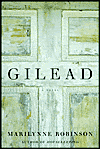
In 1956, toward the end of Reverend John Ames's life, he begins a letter to his young son, an account of himself and his forebears. Ames is the son of an Iowan preacher and the grandson of a minister who, as a young man in Maine, saw a vision of Christ bound in chains and came west to Kansas to fight for abolition: He "preached men into the Civil War," then, at age fifty, became a chaplain in the Union Army, losing his right eye in battle. Reverend Ames writes to his son about the tension between his father--an ardent pacifist--and his grandfather, whose pistol and bloody shirts, concealed in an army blanket, may be relics from the fight between the abolitionists and those settlers who wanted to vote Kansas into the union as a slave state. And he tells a story of the sacred bonds between fathers and sons, which are tested in his tender and strained relationship with his namesake, John Ames Boughton, his best friend's wayward son.
This is also the tale of another remarkable vision--not a corporeal vision of God but the vision of life as a wondrously strange creation. It tells how wisdom was forged in Ames's soul during his solitary life, and how history lives through generations, pervasively present even when betrayed and forgotten.
Winner of the 2005 Pulitzer Prize, this book is not a book that you read if you want fast moving action. Ostensibly a letter to his young son, it is also a study of the faith of John Ames, particularly in the context of the relationships he had with his family, his parishioners, his best friend, and his namesake who is the rebellious younger son of his friend.
I particularly enjoyed reading of the struggles as John Ames tried to learn how to communicate with his namesake Jack Boughton. Jack is a man who never fitted in anywhere, even in his own family, and the persistence between the two to try and get to understand each other.
The writing is beautiful, and I am sure will touch many people, but for me, I think that this was not the kind of book that I needed to read at this particular moment. It was just too introspective I guess. There were magical moments scattered throughout though. An incident that happened in the late 1800's involving a horse getting stuck in a collapsing tunnel had me laughing out loud on the train, and the ending had me tearing up, once again on the train!
The reason why I read this book now is because it is this month's book in a group I read in. It's interesting looking at the dynamics of the group and seeing who enjoyed it compared to those who didn't. The discussion with this particular book tends to make the reading experience for me! So the rating below reflects my own personal reaction - I might review it later once others add their interpretation and I get extra insights!!
Rating 3.5/5
No comments:
Post a Comment